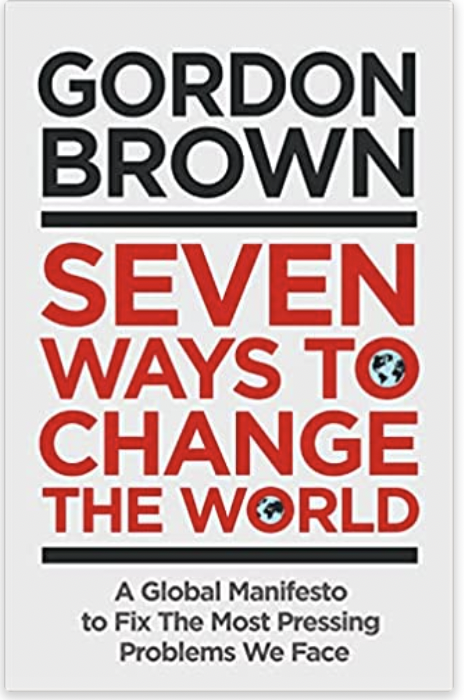
Brown’s vision for better globalisation


Gordon Brown, former Prime Minister identifies seven key areas of global crisis, and sets out a compelling argument for ensuring practical change to create a fairer, safer and more equal society, which includes global health, climate change, and environmental damage, nuclear proliferation, global financial instability, the humanitarian crisis and global poverty, the barriers to education and opportunity and global inequality and its biggest manifestation, global tax havens. Each one presents immense challenge that requires an urgent global response and solution. All should be on the world’s agenda toady. None can be solved by one nation on its own, but ll cane addressed if we work together as a global community.
Brown who has seen dramatic changes in the world, as borders have been thrown open in finance, trade and communications, remains confident the despite the many obstacles in our way, we will find a path to regeneration via a new era of global order, and we are beginning to see the means by which it might be resolved. Crisis create opportunities and having two at once shouldn’t just focus the mind. It might even be seen as giving greater grounds for hope.
Brown provides an authoritative and inspirational pathway to a better future that is essential reading for policy makers and concerns citizens alike.
Globalisation has dismantled the barriers that protected their security, wages and well-being. The result has been a divide, now deepened by Covid-19.
Freeing up global finance brought cheaper mortgages but also a financial crisis. Freer trade may bring cheaper food, but bankrupt local farmers- and who regulates the overseas suppliers?
In the 1990s, many centrist politicians believed that full globalisation could be managed through a combination of more robust global governance and generous aid to help the poorest countries compete.
Brown calls for more money for development, including a “Marshall Plan for Africa”. In 1997,Brown was part of a Labour government that transformed UK aid, adopting a spending target of o.7 per cent of GDP and creating an independent aid agency. Boris Johnson’s current Conservative government has suspended the aid commitment and merged the Department for International Development (DfID) with the Foreign Office.
Brown described the recent G7 Summit commitments on vaccines as “an unforgivable moral failure”. His proposals for more agreed funding for health, education, the achievement of net-zero carbon emissions and the sustainable development goals will be sought to realise in the current climate.
The prime focus of the book is reform of global governance and he draws together ideas he had been building since 1990s, reforming the International Monetary Fund to create an Financial early warning system echoes the changes he pressed for after the 1997 Asian Financial crisis. His call for a UN Tax convention to ensure fairer payment of tax and greater UN-World Bank co-operation to advance Sustainable Development Goals echo argument that Brown made around the turn of the century.
In response to Pandemic, Brown calls for the strengthening of the World Health Organisation and a “burden sharing formula”fro global health contributions, which works out at 27 per cent for the US and 13 per cent for China with UK at 6 per cent.
Brown downplays the central role played by the G7 to write-off debts of the poorest developing countries in 2005, and rallying the G20 in 2009, to agree a bold plan for managing the global financial crisis.
Seven Ways to Change the World: How to Fix the Most Pressing Problems We Face by Gordon Brown , Simon & Schuster £25, 512 pages.
